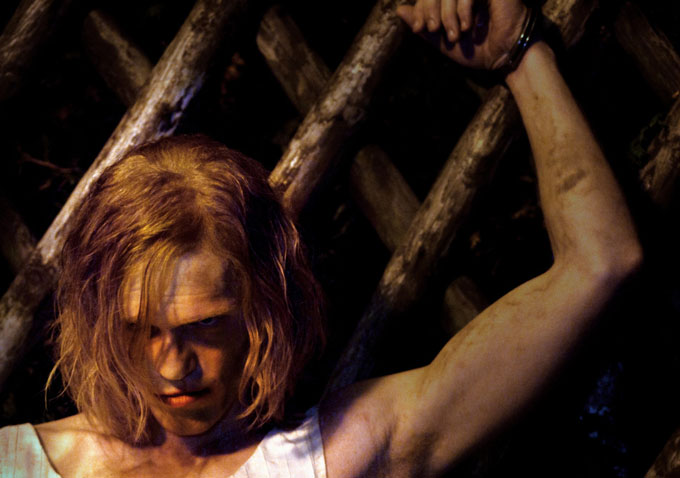
The fear of otherness drives most horror movies, since what we can’t explain (or choose not to) also happens to be very, very scary. For the East Germany villagers in “Der Samurai,” a truly bizarre, utterly nightmarish horror thriller, they know what’s out there: wolves. Wolves stalk the surrounding forests and occasionally come into the village, overturning trashcans and menacing local pets. But there is something even more menacing that comes out of the woods one night: a transvestite, in a pristine white dress (almost like a wedding gown), wielding a samurai sword. And this samurai wreaks a lot more havoc than any wolf ever could.
The movie opens with a young beat cop (Michel Diercks) leaving a bag of bloody innards in the woods. It’s a startling image to start the movie with, for sure, and only gradually does it become apparent who this guy is. Still, it’s unclear whether or not he’s trying to bait the problematic wolves or if he’s just feeding them. (Considering the grief he gives a pack of kids on scooters, he seems pretty by-the-books), Later that day he receives a package at his desk addressed to “lonely wolf,” accompanied by a mysterious phone call later that same night instructing him where to deliver the long, slender package. The phone can has shades of David Lynch‘s “Lost Highway,” and sets the dreamlike tone for the rest of the movie, which becomes increasingly bizarre with each passing moment.

The cop comes upon a cabin-like house that is dilapidated and, upon entering, discovers a man with long, straggly hair, liberally applying lipstick to his face (Pit Bukowski). The cop hands over the package, and its contents are revealed: a slim samurai sword, its blade glistening like a single elongated drop of dew. The cop suddenly realizes how dangerous the situation has become, and tries to stop him, to no avail. The sword seems to give him some kind of supernatural powers (he jumps in front of a moving train and vaporizes on the other side of the tracks), although this could just be the overactive imagination of the policeman.
For the rest of “Der Samurai,” it’s the cop pursuing the samurai, and all sorts of havoc being unleashed. Early on there’s an incredibly memorable sequence where the cop is walking down one of the main roads in the town after the samurai has rampaged, and everything is sliced up – clothes hanging from lines in the backyard, tires, bushes. Like the wolf, the samurai is an elemental force of nature and a mythological trickster all at once; the cop feels helpless (especially since he left his gun back at the station) and so does the audience. How can this possibly end?

Writer/director Till Kleinhert does an admirable job of keeping the tension mounting while piling on the surrealist flourishes, even if the two occasionally cancel each other out. Kleinhert can certainly build suspense, particularly when he’s playing up the weird psychosexual tension between the two (emphasis on psycho), although the fact that he makes the madman a transvestite, without much thought or consideration, is enough to give anyone pause. Unlike, say, “Silence of the Lambs,” where the gender issues were built into the character’s psychology, here it just seems like a stylistic embellishment, and the image of a bridal gown, covered in viscera, brings to mind “Kill Bill” a little too literally. It begs the question: if the cross-dressing doesn’t mean anything, why do it? (Unfortunately, this is a case when sexual otherness is played up for visceral thrills instead of thoughtful insight.)
A larger issue for “De Samurai,” though, is the way that the fantasy elements mix into the main narrative. There’s a terrific moment when the cop flags down a young woman to give him a ride. It’s been established that the cop is something of a square, living at home with his elderly grandmother and trying his best at his job (even when forgetting his gun). And right before he leaves this woman’s car, he reaches in and plants a super romantic, totally movie-worthy kiss on her, full-on. But then it comes, instantly, back to the interior of the car. He didn’t actually do anything. It was all in his mind.

But these same elements of fantasy, stuff that is constantly edging towards the supernatural, makes somewhat less sense when it comes to the samurai, especially because his character is so ill-defined in the first place. What exactly is this guy? And is he really able to do all of these things and get away with it? At one point he massacres a large section of the town’s population, in a swift, precise strike. Was he really able to accomplish this single-handedly? And what of his connection to the wolves in the forest? These questions certainly add much to the overall mood of the movie but sometimes specifics are needed.
Still, there’s a lot to love about “Der Samurai” – it’s boldness, the lead performance by Diercks, which is sort of like what would happen if John C. Reilly‘s character from “Magnolia” found himself in the middle of “Seven,” and a truly incredible final shot set to a cheesy pop song by Swedish glam band The Ark – even if the pieces don’t always add up. It’s a film better experienced than intellectualized, one that unfolds like a dream. And like a dream, afterwards, you’ll probably ask yourself: Did I really just see that? [B]
Browse through all our coverage of the 2014 Tribeca Film Festival by clicking here.

